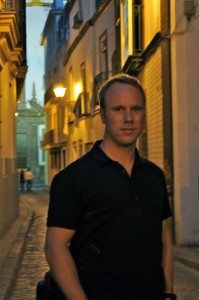Five-Year Updates: Meet Jason Taylor F’07
I’m going to kick off the week with a new Five-Year Update. Jason is a thoroughly memorable member of the Fletcher community, and particularly of the Admissions student staff. He both worked in the office and also served a year on the Admissions Committee. Here’s his update.
I was still in the Peace Corps when I first visited the Fletcher website. On it was a short account of one student’s Fletcher summer. I remember reading with a mix of envy and awe. The student had done seemingly everything — traveling to several Asian countries doing development work, thesis research, and some other adventures on the side. She seemed to embody everything I hoped to be: a restless mind in the thick of it, who was using grad study to actively and deliberately lay the groundwork for a future career. From that point on, Fletcher became my first choice in graduate schools. I wanted to be surrounded by students like that person. Heck, I wanted to be that person. Every Fletcher interaction that followed confirmed that Fletcher was where I wanted to be. My communication with the Admissions Office. My first visit to the Hall of Flags. I was so sure about Fletcher that it ended up being the only school I applied to. If graduate school isn’t Fletcher, I thought, then I don’t want graduate school.
Not long after, I was in the thick of my own Fletcher summer. I did project work in the bush of Uganda, followed by refugee thesis research in Central America. I finished with a leadership conference in France. I’d visited three continents in three months and got to focus on everything from activity design, to policy formation, to the dynamics of international negotiation. I’m not rich. All of this was mostly funded by Fletcher-related sources. That summer was a microcosm of the Fletcher experience itself. It’s as diverse as you want it to be. There are no limits. Fletcher gave me the freedom to mold my degree as I went along; my degree, rather than feeling like an exercise in path dependence, felt like it was in a constant, enthralling state of becoming. The rigor of study exposed my weaknesses, and the support of the School and community gave me the confidence to address them. I left Fletcher with a clear vision of the impact I wanted to make and the confidence that I had the skills to be successful.
Following Fletcher, I became a Presidential Management Fellow and worked at USAID on humanitarian food assistance programs. During my first years I worked on the Haiti earthquake response and Madagascar during a coup, and I covered Sudan during the referendum that created South Sudan, the world’s newest nation. Two years ago I converted to the USAID foreign service and am the deputy chief of the food assistance office in Ethiopia — the largest of its kind in the world. It’s a tough job but I love it. I think back often to what I learned at Fletcher and I know that the School’s equal emphasis on skill building and community were the perfect preparation for my work. My days are a jumble of activity management, policy advocacy, and negotiation — all the things that made that summer so interesting. I feel like the work I do is important and that my personal role in unfolding events matters. I took a few Peace Corps volunteers out to dinner the other night. I listened to them talk about their projects and admired their enthusiasm. Some were thinking about careers in this field. For me, Fletcher was the bridge between being a relative beginner and being a professional. I know I wasn’t the first to cross that bridge and I certainly won’t be the last.
